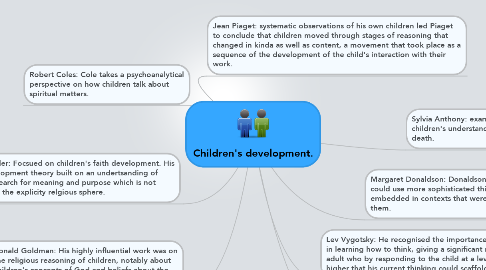Children's development.
by Naomi Cassidy

1. Jean Piaget: systematic observations of his own children led Piaget to conclude that children moved through stages of reasoning that changed in kinda as well as content, a movement that took place as a sequence of the development of the child's interaction with their work.
2. Lawrence Kohlberg: Kohlberg's research into children's moral reasoning led him to conclude that children move through 3 stages, each sub-divided into 2 to reach full maturity in their thinking about morality.
3. Ronald Goldman: His highly influential work was on the religious reasoning of children, notably about children's concepts of God and beliefs about the bible.
4. James Fowler: Focsued on children's faith development. His stage development theory built on an undertsanding of gaith as a search for meaning and purpose which is not confined to the explicity relgious sphere.
5. Robert Coles: Cole takes a psychoanalytical perspective on how children talk about spiritual matters.
6. Lev Vygotsky: He recognised the importance of language in learning how to think, giving a significant role to the adult who by responding to the child at a level slightly higher that his current thinking could scaffold his learning.
7. Margaret Donaldson: Donaldson indicated that children could use more sophisticated thinking if the tasks were embedded in contexts that were real and meaningful to them.
7.1. lki
8. Sylvia Anthony: examined children's understanding of death.


